Ready for your next sales promotion?
For some ecommerce teams, it's a time-consuming task deciding which items to markdown and how to publicize a sales event. However, sales promotions play an integral role in attracting customers.
A survey found that up to 50% of consumers make a purchase only with a promotion. Shoppers desire a good deal before they invest in your products. Moreover, your business may want the additional revenue.
“Sales promotions can give you the edge you're looking for when it comes to revenue. Successful companies know that sales promotions are among the most effective methods of increasing sales and building customer satisfaction,” writes Emily Weisberg, content marketing manager at ThriveHive.
Take a strategic approach when planning your sales promotions. Below are five smart ways to help your team.
1. Select Specific Incentives
Sales promotions take various shapes and forms. Cater your incentives to fit your consumers' needs.
Start by using customer analytics. Historical purchasing habits can uncover what promotions performed well. Social media comments also provide first-hand details on whether customers possess interest.
Next, match your findings with a sales initiative. From mystery discounts to purchased-based donations to bundle sales, several options exist.
Monetate “found that 56% of businesses agree that flash-sale campaigns are better received than regular campaigns.” Limiting the timeframe creates urgency for the customer to act now.
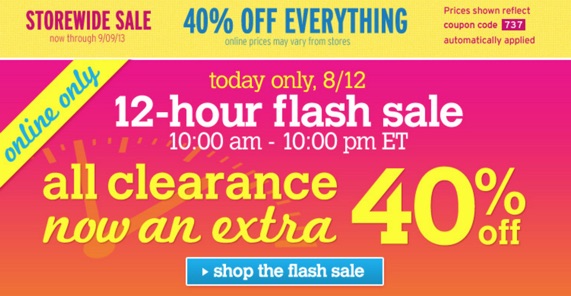
Thinking about free offers? PaySimple's Vice President of Knowledge Lisa Hephner explains the power of free incentives:
“Everyone loves free. Whether it's free gifts, free refills, or free service segments, free sells. One of the most powerful free offers is free shipping for online orders, as evidenced by multiple studies where respondents highlight it as the most important factor in making a purchase decision.”
Figure out the best promotions for your customers. Review your data before moving forward.
2. Cross-Sell With a Purpose
Every sales promotion doesn't need to involve discounting your signature product. Instead, it can focus on secondary items.
Cross-selling is another opportunity to provide value to your customers. Buyers love convenience, and they want to save time shopping at one place. And it eliminates the hassle of sifting through multiple ecommerce sites.
Align your promotions with products that complement one another. Give consumers the chance to buy everything they need from your store.
“Savvy marketers use this concept to increase sales by informing consumers how one product complements another. Cross selling can take several forms. Understanding your customers' motivations helps you choose which approach to take,” says Sara Huter, a contributor at BusinessBee.
For example, if your company sells cell phones, your team can offer a promotion on the accessories, like bluetooth earbuds, phone cases, or charging cables.
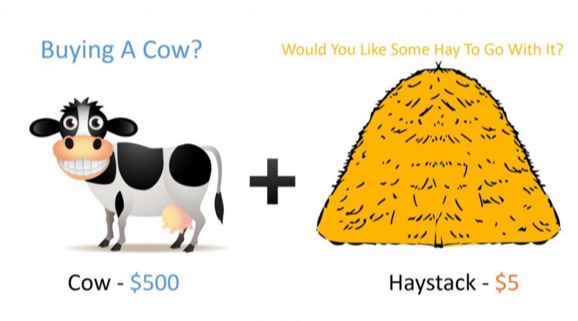
Research found that “cross-selling was shown to be much more effective when presented on the checkout pages versus the product pages.” So, add images of promotional products in the sidebar menu.
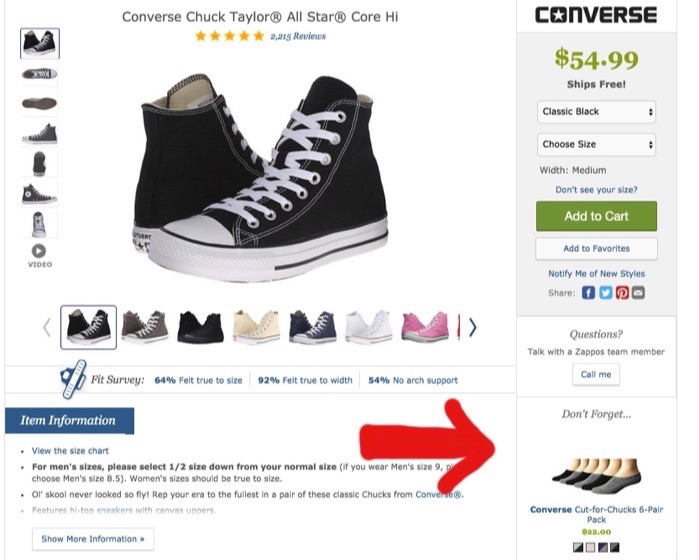
Here's another example of cross-selling taking place immediately after a customer adds an item to their cart:

Plus, cross-selling aids with bringing in more cash flow for your business. Amazon credits up to 35% of its revenue to cross-selling.
Think differently about ecommerce sales promotions. Don't remove cross-selling from your list of possibilities.
3. Microtarget Your Customers
Micro-targeting isn't a new technique to your team. Nevertheless, you may be failing to put it into practice.
Segmenting your audience lets your business offer the right promotions to the right individuals. Customization speaks directly to consumers-signaling that you know exactly what they need.
Melissa Jenkins of Mel Jens Designs believes “running a successful promotion is all about finding that delicate balance between audience segmentation, great timing and setting the perfect price or placing the perfect offer.”
Examine your data to segment properly. Try geographical locations, buying habits, income levels, or even past purchasing behavior.
Dealers United Auto Group created mock ads targeted for car shoppers within 25 miles of the dealership that possess an interest in pets. Specificity is vital for effective micro targeting.
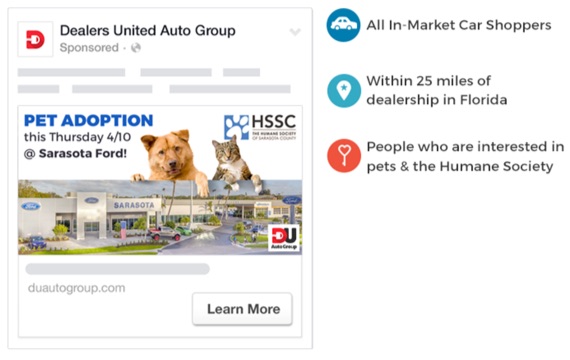
A study reveals that 51% of marketers believe sharing data across their organizations is a major issue. Avoid data limitations that will hinder segmentation for your sales promotions.
Create an open dialogue across departments to gather all data about your customers. You'll have more knowledge to build an accurate buyer persona.
Pinpoint who needs to know about your sales event. Micro-targeting is a benefit to your company.
4. Hype Up Engagement
Draw attention to your sales promotions with social media and email campaigns. This extra engagement will get people interested in your sales incentives.
Facebook users spend an average of 50 minutes a day on its multiple platforms. Work with your team to promote sales on your social pages. Or even enlist the help of industry influencers to spread the word.
User-generated content (UGC) is also another way to lure shoppers toward your brand. An actual consumer enjoying your products authenticates your value to hesitated buyers.
“User-generated photos are a great way to generate social proof. Prospective customers see that your products are regularly being purchased people just like them, and feel more comfortable doing something that others are doing,” says Dan Wang, a content specialist at Shopify.
Big box retailer Target retweeted a post from loyal shoppers who made a funny video in one of its stores. Encourage customers to submit UGC of them unboxing your products.
when @Target is having a sale pic.twitter.com/RIUu6p3zLs
- spooky addie |-/ (@blurrytylerjosh) October 15, 2016
Also, keep your email subscribers in the loop about promotions. Craft engaging emails that explain the benefits, provide social proof, and use a distinct call-to-action.
“When it comes to creating a high-converting marketing offer email, the final piece of the puzzle is using a prominent call to action button. This is important because buttons make it clear to the reader what the next step is and encourage them to click-through,” states Aaron Beashel, director of demand generation at Campaign Monitor.
Shout your sales promotions from the rooftop. Get shoppers excited to participate.
5. Move Toward Customer Loyalty
Returning customers spend on average 67% more than first-time customers. Consider promotions as a pathway to retaining customers.
Give your customers an opportunity to discover your brand's values and culture. Sign up shoppers for your weekly newsletter, or enroll them in your rewards program.
Customer loyalty centers around building worthwhile relationships. However, buyers may only be interested in your promotions.
“The use of sales promotions can be positively utilized in order to encourage brand loyalty and brand switching by companies. However, academic research suggests that consumers can become loyal to sales promotions rather than a brand,” states Zhorna Ali, a sales and marketing assistant at M3.
To avoid consumers from brand switching, companies must thoroughly personalize their sales promotions strategy. Focus on specific product categories to remain competitive within the market.
Rather than giving sales incentives to everyone, Bare Escentuals limits its promotions to its loyal fans called Beauty Insiders. In the example below, customers received three free items with any order.
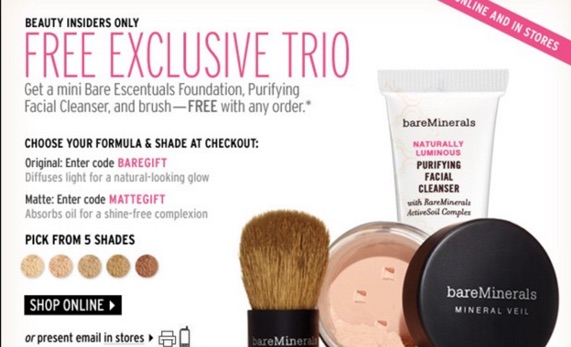
Create plans to engage customers beyond your sales promotions. Earn their loyalty.
Prep for Sales Promotions
Planning for your next sales event involves lots of time and decision-making. You want to boost your revenue and satisfy customers.
Choose buyer-specific incentives that will attract people. Cross-sell products that complement one another. And think beyond the promotion by focusing on customer loyalty initiatives.
Upgrade your sales promotion. Prepare for it today.
About the Author: Shayla Price lives at the intersection of digital marketing, technology and social responsibility. Connect with her on Twitter @shaylaprice.
No comments:
Post a Comment